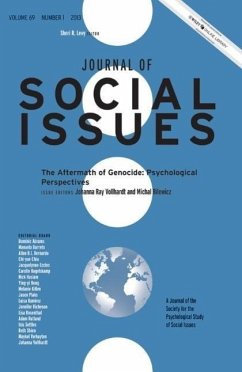The Aftermath of Genocide
Psychological Perspectives
Herausgegeben von Vollhardt, Johanna Ray; Bilewicz, Michal
The Aftermath of Genocide
Psychological Perspectives
Herausgegeben von Vollhardt, Johanna Ray; Bilewicz, Michal
- Broschiertes Buch
- Merkliste
- Auf die Merkliste
- Bewerten Bewerten
- Teilen
- Produkt teilen
- Produkterinnerung
- Produkterinnerung
The issue explores psychological consequences of past genocide. It uses a multiplicity of theoretical approaches to understand how historical genocide affects current intergroup relations and psychological well-being.
Andere Kunden interessierten sich auch für
![The Psychology of Diversity The Psychology of Diversity]() James M. JonesThe Psychology of Diversity110,99 €
James M. JonesThe Psychology of Diversity110,99 €![The Flexibility Stigma The Flexibility Stigma]() The Flexibility Stigma47,99 €
The Flexibility Stigma47,99 €![The Encyclopedia of Positive Psychology The Encyclopedia of Positive Psychology]() The Encyclopedia of Positive Psychology100,99 €
The Encyclopedia of Positive Psychology100,99 €![Operant & Classical Conditioni Operant & Classical Conditioni]() Frances K. McSweeneyOperant & Classical Conditioni226,99 €
Frances K. McSweeneyOperant & Classical Conditioni226,99 €![The Wiley Blackwell Handbook of Positive Psychological Interventions The Wiley Blackwell Handbook of Positive Psychological Interventions]() Stephen SchuellerThe Wiley Blackwell Handbook of Positive Psychological Interventions217,99 €
Stephen SchuellerThe Wiley Blackwell Handbook of Positive Psychological Interventions217,99 €![Sustainability in Combining Career and Care Sustainability in Combining Career and Care]() Sustainability in Combining Career and Care49,99 €
Sustainability in Combining Career and Care49,99 €![The Psychology of Authoritarian Leaders The Psychology of Authoritarian Leaders]() Edward DunbarThe Psychology of Authoritarian Leaders121,99 €
Edward DunbarThe Psychology of Authoritarian Leaders121,99 €-
-
-
The issue explores psychological consequences of past genocide. It uses a multiplicity of
theoretical approaches to understand how historical genocide affects current
intergroup relations and psychological well-being.
Hinweis: Dieser Artikel kann nur an eine deutsche Lieferadresse ausgeliefert werden.
theoretical approaches to understand how historical genocide affects current
intergroup relations and psychological well-being.
Hinweis: Dieser Artikel kann nur an eine deutsche Lieferadresse ausgeliefert werden.
Produktdetails
- Produktdetails
- Journal of Social Issues (JOSI) Vol.69 / 1
- Verlag: Wiley & Sons
- 1. Auflage
- Seitenzahl: 500
- Erscheinungstermin: 1. April 2013
- Englisch
- Abmessung: 226mm x 152mm x 13mm
- Gewicht: 666g
- ISBN-13: 9781118691564
- ISBN-10: 1118691563
- Artikelnr.: 40133953
- Herstellerkennzeichnung
- Libri GmbH
- Europaallee 1
- 36244 Bad Hersfeld
- gpsr@libri.de
- Journal of Social Issues (JOSI) Vol.69 / 1
- Verlag: Wiley & Sons
- 1. Auflage
- Seitenzahl: 500
- Erscheinungstermin: 1. April 2013
- Englisch
- Abmessung: 226mm x 152mm x 13mm
- Gewicht: 666g
- ISBN-13: 9781118691564
- ISBN-10: 1118691563
- Artikelnr.: 40133953
- Herstellerkennzeichnung
- Libri GmbH
- Europaallee 1
- 36244 Bad Hersfeld
- gpsr@libri.de
Johanna Ray Vollhardt is an Assistant Professor of Psychology at Clark University and affiliated with the Strassler Center for Holocaust and Genocide Studies. She received her Ph.D. in Social Psychology from the University of Massachusetts Amherst, with a concentration in the Psychology of Peace and Violence. Her research focuses on inclusive victim consciousness, prosocial behavior, and intergroup relations in the aftermath of collective violence. Michal Bilewicz is an Assistant Professor at the Faculty of Psychology, University of Warsaw. He serves as the Director of the Center for Research on Prejudice at the University of Warsaw. He was Fulbright Junior Visiting Researcher at the New School for Social Research and DAAD Post- Doctoral Researcher at University of Jena in Germany. His research focuses on reconciliation processes, linguistic forms of prejudice, anti-Semitism, moral emotions, and dehumanization.
INTRODUCTION
After the Genocide: Psychological Perspectives on Victim, Bystander, and
Perpetrator Groups
Johanna Ray Vollhardt and Michal Bilewicz
SECTION I: SOCIAL PSYCHOLOGICAL PERSPECTIVES ON PROCESSES AMONG PERPETRATOR
GROUPS
National Narrative and Social Psychological Influences in Turks' Denial of
the Mass Killings of Armenians as Genocide
Rezarta Bilali
Moral Immemorial: The Rarity of Self-Criticism for Previous Generations'
Genocide or Mass Violence
Colin Wayne Leach, Fouad Bou Zeineddine, and Sabina Cehajic-Clancy
Thou Shall Not Kill . . . Your Brother: Victim-Perpetrator Cultural
Closeness and Moral Disapproval of Polish Atrocities against Jews after the
Holocaust
Miroslaw Kofta and Patrycja Slawuta
When the Past is Far from Dead: How Ongoing Consequences of Genocides
Committed by the Ingroup Impact Collective Guilt
Roland Imhoff, Michael J. A. Wohl, and Hans-Peter Erb
SECTION II: CLINICAL PERSPECTIVES ON HEALING AMONG VICTIM GROUPS
Child Survivors of the 1994 Rwandan Genocide and Trauma-Related Affect
Suzanne Kaplan
Restoring Self in Community: Collective Approaches to Psychological Trauma
after Genocide
Laurie Anne Pearlman
SECTION III: SOCIAL PSYCHOLOGICAL PERSPECTIVES ON PROCESSES AMONG VICTIM
GROUPS
The "Never Again" State of Israel: The Emergence of the Holocaust as a Core
Feature of Israeli Identity and Its Four Incongruent Voices
Yechiel Klar, Noa Shori-Eyal, and Yonat Klar
"Crime against Humanity" or "Crime against Jews"? Acknowledgment in
Construals of the Holocaust and Its Importance for Intergroup Relations
Johanna Ray Vollhardt
SECTION IV: PRACTICAL IMPLICATIONS FOR INTERVENTION AND PREVENTION
Reconciliation through the Righteous: The Narratives of Heroic Helpers as a
Fulfillment of Emotional Needs in Polish-Jewish Intergroup Contact
Michal Bilewicz and Manana Jaworska
A World without Genocide: Prevention, Reconciliation, and the Creation of
Peaceful Societies
Ervin Staub
COMMENTARY ON THE ISSUE
The Aftermath of Genocide: History as a Proximal Cause
Peter Glick and Elizabeth Levy Paluck
After the Genocide: Psychological Perspectives on Victim, Bystander, and
Perpetrator Groups
Johanna Ray Vollhardt and Michal Bilewicz
SECTION I: SOCIAL PSYCHOLOGICAL PERSPECTIVES ON PROCESSES AMONG PERPETRATOR
GROUPS
National Narrative and Social Psychological Influences in Turks' Denial of
the Mass Killings of Armenians as Genocide
Rezarta Bilali
Moral Immemorial: The Rarity of Self-Criticism for Previous Generations'
Genocide or Mass Violence
Colin Wayne Leach, Fouad Bou Zeineddine, and Sabina Cehajic-Clancy
Thou Shall Not Kill . . . Your Brother: Victim-Perpetrator Cultural
Closeness and Moral Disapproval of Polish Atrocities against Jews after the
Holocaust
Miroslaw Kofta and Patrycja Slawuta
When the Past is Far from Dead: How Ongoing Consequences of Genocides
Committed by the Ingroup Impact Collective Guilt
Roland Imhoff, Michael J. A. Wohl, and Hans-Peter Erb
SECTION II: CLINICAL PERSPECTIVES ON HEALING AMONG VICTIM GROUPS
Child Survivors of the 1994 Rwandan Genocide and Trauma-Related Affect
Suzanne Kaplan
Restoring Self in Community: Collective Approaches to Psychological Trauma
after Genocide
Laurie Anne Pearlman
SECTION III: SOCIAL PSYCHOLOGICAL PERSPECTIVES ON PROCESSES AMONG VICTIM
GROUPS
The "Never Again" State of Israel: The Emergence of the Holocaust as a Core
Feature of Israeli Identity and Its Four Incongruent Voices
Yechiel Klar, Noa Shori-Eyal, and Yonat Klar
"Crime against Humanity" or "Crime against Jews"? Acknowledgment in
Construals of the Holocaust and Its Importance for Intergroup Relations
Johanna Ray Vollhardt
SECTION IV: PRACTICAL IMPLICATIONS FOR INTERVENTION AND PREVENTION
Reconciliation through the Righteous: The Narratives of Heroic Helpers as a
Fulfillment of Emotional Needs in Polish-Jewish Intergroup Contact
Michal Bilewicz and Manana Jaworska
A World without Genocide: Prevention, Reconciliation, and the Creation of
Peaceful Societies
Ervin Staub
COMMENTARY ON THE ISSUE
The Aftermath of Genocide: History as a Proximal Cause
Peter Glick and Elizabeth Levy Paluck
INTRODUCTION
After the Genocide: Psychological Perspectives on Victim, Bystander, and
Perpetrator Groups
Johanna Ray Vollhardt and Michal Bilewicz
SECTION I: SOCIAL PSYCHOLOGICAL PERSPECTIVES ON PROCESSES AMONG PERPETRATOR
GROUPS
National Narrative and Social Psychological Influences in Turks' Denial of
the Mass Killings of Armenians as Genocide
Rezarta Bilali
Moral Immemorial: The Rarity of Self-Criticism for Previous Generations'
Genocide or Mass Violence
Colin Wayne Leach, Fouad Bou Zeineddine, and Sabina Cehajic-Clancy
Thou Shall Not Kill . . . Your Brother: Victim-Perpetrator Cultural
Closeness and Moral Disapproval of Polish Atrocities against Jews after the
Holocaust
Miroslaw Kofta and Patrycja Slawuta
When the Past is Far from Dead: How Ongoing Consequences of Genocides
Committed by the Ingroup Impact Collective Guilt
Roland Imhoff, Michael J. A. Wohl, and Hans-Peter Erb
SECTION II: CLINICAL PERSPECTIVES ON HEALING AMONG VICTIM GROUPS
Child Survivors of the 1994 Rwandan Genocide and Trauma-Related Affect
Suzanne Kaplan
Restoring Self in Community: Collective Approaches to Psychological Trauma
after Genocide
Laurie Anne Pearlman
SECTION III: SOCIAL PSYCHOLOGICAL PERSPECTIVES ON PROCESSES AMONG VICTIM
GROUPS
The "Never Again" State of Israel: The Emergence of the Holocaust as a Core
Feature of Israeli Identity and Its Four Incongruent Voices
Yechiel Klar, Noa Shori-Eyal, and Yonat Klar
"Crime against Humanity" or "Crime against Jews"? Acknowledgment in
Construals of the Holocaust and Its Importance for Intergroup Relations
Johanna Ray Vollhardt
SECTION IV: PRACTICAL IMPLICATIONS FOR INTERVENTION AND PREVENTION
Reconciliation through the Righteous: The Narratives of Heroic Helpers as a
Fulfillment of Emotional Needs in Polish-Jewish Intergroup Contact
Michal Bilewicz and Manana Jaworska
A World without Genocide: Prevention, Reconciliation, and the Creation of
Peaceful Societies
Ervin Staub
COMMENTARY ON THE ISSUE
The Aftermath of Genocide: History as a Proximal Cause
Peter Glick and Elizabeth Levy Paluck
After the Genocide: Psychological Perspectives on Victim, Bystander, and
Perpetrator Groups
Johanna Ray Vollhardt and Michal Bilewicz
SECTION I: SOCIAL PSYCHOLOGICAL PERSPECTIVES ON PROCESSES AMONG PERPETRATOR
GROUPS
National Narrative and Social Psychological Influences in Turks' Denial of
the Mass Killings of Armenians as Genocide
Rezarta Bilali
Moral Immemorial: The Rarity of Self-Criticism for Previous Generations'
Genocide or Mass Violence
Colin Wayne Leach, Fouad Bou Zeineddine, and Sabina Cehajic-Clancy
Thou Shall Not Kill . . . Your Brother: Victim-Perpetrator Cultural
Closeness and Moral Disapproval of Polish Atrocities against Jews after the
Holocaust
Miroslaw Kofta and Patrycja Slawuta
When the Past is Far from Dead: How Ongoing Consequences of Genocides
Committed by the Ingroup Impact Collective Guilt
Roland Imhoff, Michael J. A. Wohl, and Hans-Peter Erb
SECTION II: CLINICAL PERSPECTIVES ON HEALING AMONG VICTIM GROUPS
Child Survivors of the 1994 Rwandan Genocide and Trauma-Related Affect
Suzanne Kaplan
Restoring Self in Community: Collective Approaches to Psychological Trauma
after Genocide
Laurie Anne Pearlman
SECTION III: SOCIAL PSYCHOLOGICAL PERSPECTIVES ON PROCESSES AMONG VICTIM
GROUPS
The "Never Again" State of Israel: The Emergence of the Holocaust as a Core
Feature of Israeli Identity and Its Four Incongruent Voices
Yechiel Klar, Noa Shori-Eyal, and Yonat Klar
"Crime against Humanity" or "Crime against Jews"? Acknowledgment in
Construals of the Holocaust and Its Importance for Intergroup Relations
Johanna Ray Vollhardt
SECTION IV: PRACTICAL IMPLICATIONS FOR INTERVENTION AND PREVENTION
Reconciliation through the Righteous: The Narratives of Heroic Helpers as a
Fulfillment of Emotional Needs in Polish-Jewish Intergroup Contact
Michal Bilewicz and Manana Jaworska
A World without Genocide: Prevention, Reconciliation, and the Creation of
Peaceful Societies
Ervin Staub
COMMENTARY ON THE ISSUE
The Aftermath of Genocide: History as a Proximal Cause
Peter Glick and Elizabeth Levy Paluck








